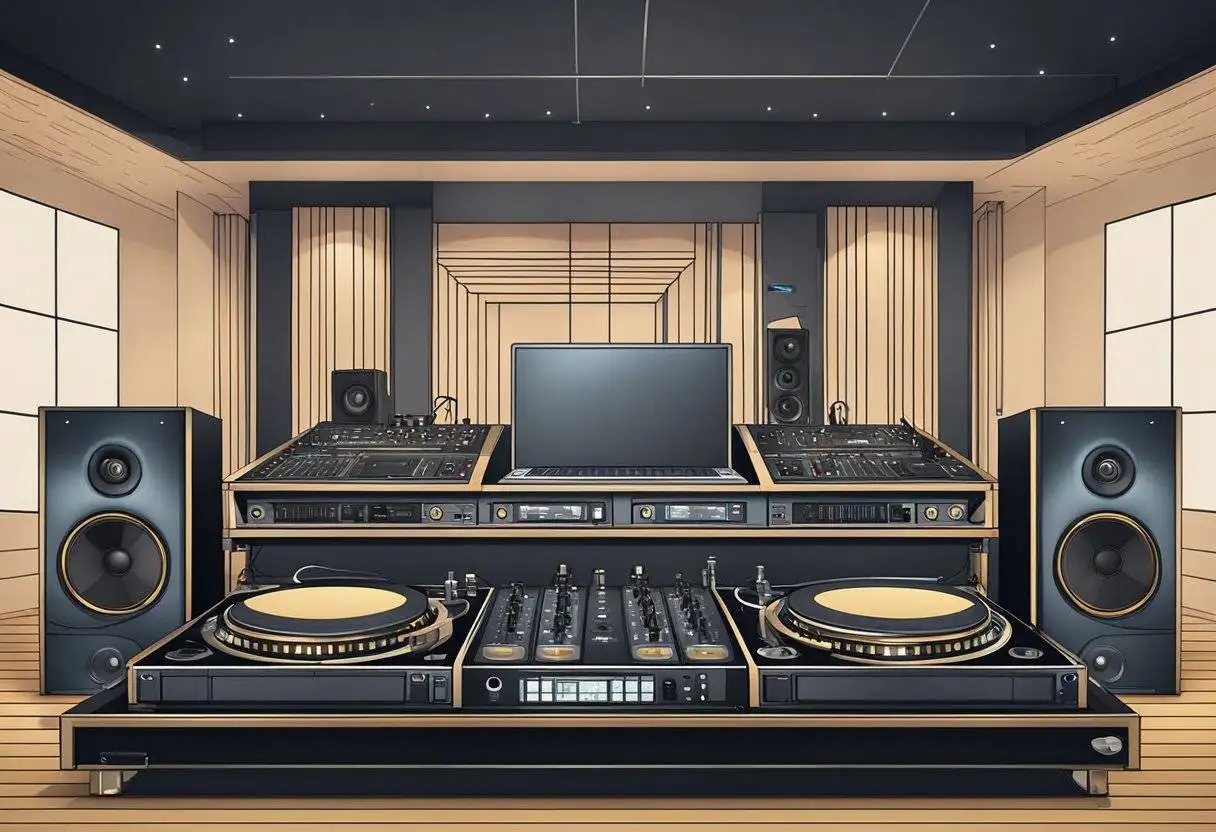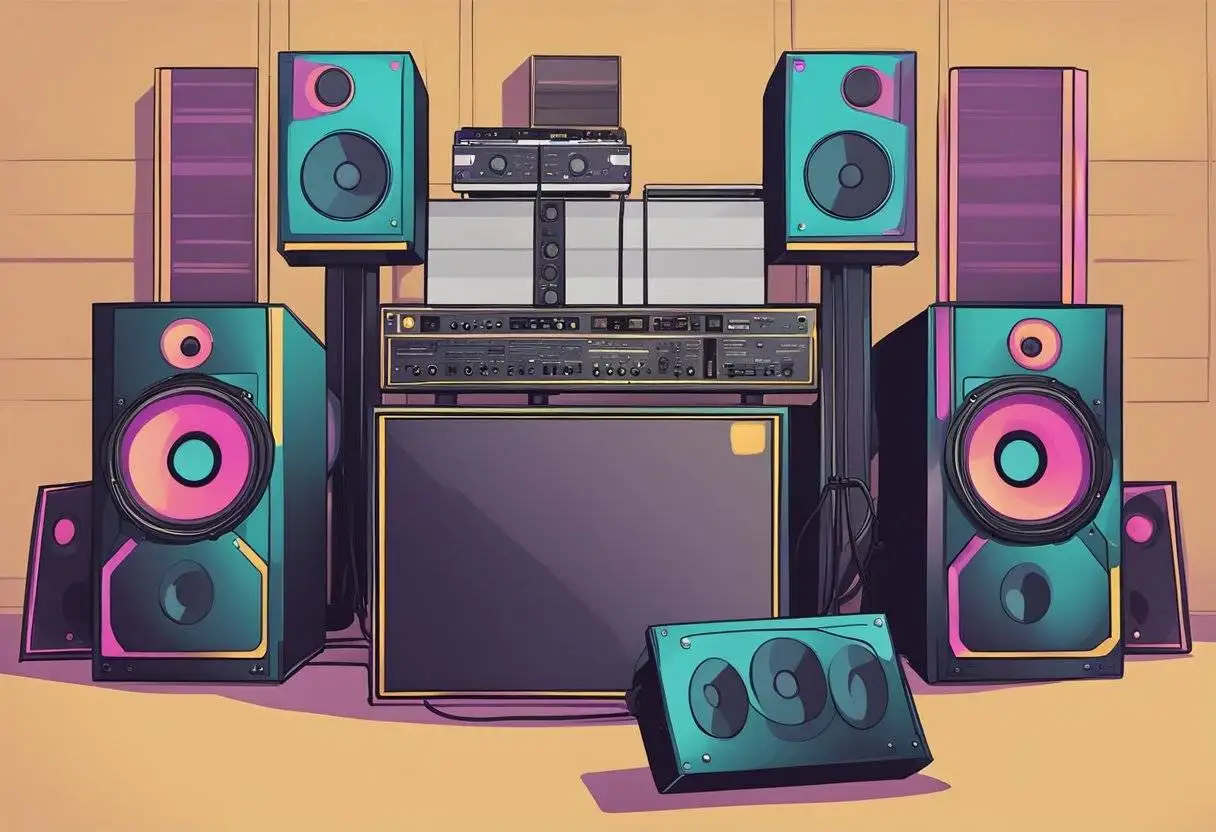When it comes to DJing, one of the essential components of a successful event is undoubtedly the sound system. Through my experience and observations in the DJ scene, the question of whether DJs bring their own speakers has diverse answers. While some DJs prefer to rely on the provided equipment at venues, mobile DJs often transport their own sound systems for various gigs. Variables such as the type of event, the size of the venue, and logistical concerns play a significant role in this decision.

Another consideration for DJs when deliberating on whether to bring speakers is the personal approach to their craft. DJs who practice extensively at home or those who have a precise setup that complements their style might lean towards using their own equipment. Appreciating the quality and reliability of a known sound system also suggests why a DJ might choose to carry their speakers, ensuring their performance meets their standards.
Key Takeaways
- DJs make a choice on speakers based on event type and personal preference.
- Mobile DJs are more likely to use their own sound systems.
- A DJ’s familiarity with their own equipment can impact performance quality.
Understanding DJ Equipment

As a DJ, having a reliable setup is crucial for delivering stellar performances. A comprehensive understanding of DJ gear is essential in creating the best possible sound experience for the audience.
Core Components of DJ Gear
Mixers: My mixer is the epicenter of my DJ setup, allowing me to transition and blend tracks seamlessly. It’s crucial for controlling volume, EQ, and sometimes even effects.
DJ Controllers and CDJs: Controllers give me tactile control over the DJ software running on my laptop, while CDJs allow me to spin tracks from CDs or a USB drive without a computer. Each has its place in a DJ’s equipment lineup.
Turntables: For a vinyl experience, I use turntables, which offer the classic feel and control that DJs have valued for decades.
Laptop and DJ Software: A high-performance laptop is my library and control center when using digital DJ software like Serato or Ableton, making it possible to manipulate digital audio with precision.
Audio Interfaces: To ensure the best audio quality, I use an audio interface that acts as the middleman between my laptop and mixer, guaranteeing a clear signal path.
Microphones and Cables: I can never forget about the essentials like microphones for MCing or addressing the crowd and cables for connecting all my equipment.
Amplifiers: In some setups, an amplifier might be necessary to boost the sound before it reaches the speakers, ensuring solid sound quality with enough volume to fill the room.
Speaker Specifications and Types
Active vs Passive Speakers: For my gigs, I consider whether to use active speakers, which have built-in amplifiers, or passive speakers that require an external amplifier. This decision greatly affects setup time and portability.
Sound Quality and Durability: When selecting speakers, I prioritize sound quality and durability. Speakers need to deliver excellent clarity at high volumes while withstanding the rigors of transport and use.
Connectivity Options: I also look for speakers with a variety of inputs—such as XLR, TRS, or even Bluetooth—so I can easily connect them to my mixer or controller.
Portability: As a mobile DJ, I’ve learned that the weight and size of the speakers can have a significant impact on my setup, especially when travelling to different venues.
Through careful selection and understanding of each component—in terms of function, compatibility, and quality—I tailor my DJ equipment to cater to any event, ensuring a robust setup that allows me to perform at my best.
Essential Aspects of Sound Systems
When considering sound systems for DJ events, understanding the type of speakers and the intricacies of their sound amplification is critical to delivering a high-quality audio experience.
Active vs Passive Speakers
Active speakers have built-in amplifiers which allow them to power themselves, simplifying setup and reducing the amount of gear required. I find that they are particularly convenient for mobile DJs who need to set up and tear down their systems efficiently. Passive speakers, on the other hand, require an external amplifier. The choice between active and passive speakers often depends on the venue and personal preference, with considerations for portability and sound quality.
Amplification and Sound Quality
The amplifier’s role is crucial as it boosts the audio signal to a level that can drive speakers adequately. Sound quality is influenced by the amplifier’s power output, typically measured in watts. I ensure that the rms (root mean square) wattage—a representation of continuous power handling—matches the speakers’ rating to avoid distortion or damage. Higher wattage doesn’t necessarily mean better sound, but it does provide headroom for cleaner audio at higher volumes. Whether I’m using a standalone PA system or a set of DJ speakers, I always consider wattage and amplification to achieve the sound performance desired.
Practical Considerations for DJs

As a DJ, it’s critical to assess the specifics of the venue and event, alongside the logistics of transportation and setup to ensure a successful performance. The decision to bring my own speakers hinges on these factors, influencing both the experience of the audience and my own ease of operation during the event.
Venue and Event Types
When I play at different venues, I consider the venue size, its in-house sound system, and the genre of music I’ll be performing. Clubs generally have a professional-grade sound setup tailored for electronic music, often making it unnecessary for me to bring my own speakers. However, playing at a private event, like a wedding or a corporate function as a Mobile DJ, could mean needing to transport my own DJ system, especially if the venue lacks adequate equipment.
Size and Acoustics:
- Small venue: Smaller, portable speakers might suffice.
- Large venue: Requires more powerful speakers to fill the space.
In-House Equipment:
- Available: I might just bring specific components like my DJ mixer.
- Not available: A full setup is required, including passive or active speakers.
Transportation and Setup
When it comes to transporting my gear, the size of my vehicle dictates the bulk and quantity of equipment I can carry. For local gigs, a compact car may suffice to carry my headphones, headphone adapter, and a DJ controller. For more sizable equipment like speakers, a larger vehicle may be necessary, especially if I’m carrying passive speakers which require separate amplifiers. Moreover, the process of setup is critical; I always ensure I have enough time pre-event to set up and troubleshoot any issues.
Setup Considerations:
- Quick setup: Active speakers are preferable as they have built-in amplifiers.
- Extended setup: Passive speakers could provide better sound but need more time for setup.
Transport Logistics:
- Small setup: I could use a regular sedan for transport.
- Large setup: May require a van or a truck, and possibly additional help.
Choosing the right equipment for each DJ gig is a delicate balance of understanding the venue, audience, and the budget available. As a professional in my DJ career, I not only consider the type of event and location but also the practicality of moving and setting up my gear to ensure the best possible audio experience for the audience and a stress-free performance for myself.
Advancing DJ Skills and Performance
As a DJ, the advancement of my skills and performance depends significantly on the techniques I employ and the way I interact with my music and digital tools. I understand that staying versatile and responsive to the evolving DJ landscape is critical for the growth of my DJ career.
Techniques and Music Selection
I’ve learned to refine my mixing techniques, ensuring that my music selection is not only vast but also well-curated. Each set I play is thought out, with tracks chosen not just for their individual qualities but for how they blend with each other harmonically. Techniques like beatmatching are fundamentals I mastered early in my career. Going beyond, I’ve explored the nuances of advanced DJ mixing techniques to create a seamless experience on the dance floor. The equipment I use, like DJ mixers and controllers such as the Denon DJ SC5000 Prime Media Player, play an essential role in delivering a high-quality performance.
- Key Skills:
- Beatmatching
- Harmonic mixing
- Use of DJ controllers and mixers
- Equipment:
- Mixer: Pioneer DJM series
- Controller: Denon DJ SC5000 Prime Media Player
Integration with Digital Tools and Software
When it comes to integrating digital tools and software into my performances, I leverage programs like Rekordbox and Traktor to manage my tracks and enhance my sets. My laptop is the central hub that connects my controller, the mixer, and sometimes, lighting systems to create a cohesive audio-visual experience. I utilize software capabilities for not only music management but for creative mixing and music production as well. This integration elevates my performances and is something I see as indispensable for any DJ, especially for someone embracing a beginner DJ journey.
- Software Proficiency:
- Music management: Rekordbox
- Creative mixing: Traktor
- Digital Integration:
- Laptop as the central hub
- Connection of: Controller, Mixer, Lighting systems
Frequently Asked Questions
In this section, I tackle some of the common inquiries regarding whether DJs bring their own speakers, among other equipment, to performances.
What equipment do DJs typically provide for a performance?
I generally bring turntables or CDJs, a mixer, headphones, and a laptop to my gigs. Sometimes, depending on the event, I may also provide microphones and a controller.
Are DJs responsible for their own sound systems at gigs?
The responsibility for sound systems often falls on me, especially for private events and smaller venues. However, larger venues or festivals typically have their own sound system in place.
Is it common for venues to supply speakers for DJ events?
It’s quite common for clubs and event venues to have an in-house sound system, including speakers, which I can use. This means I don’t have to bring my own for every gig.
What are the essential pieces of equipment a DJ needs to perform?
To perform, I essentially need a music source, such as turntables or a laptop, a mixer to combine tracks, headphones for cueing, and speakers to broadcast the sound.
Should a DJ invest in personal speakers for home practice sessions?
Yes, I believe investing in personal speakers is beneficial for home practice. It allows me to get a better feel for how tracks will sound in a live setting.
How does equipment responsibility vary for DJs across different countries?
In my experience, equipment expectations can vary widely, with some countries’ venues providing a full setup, while others require me to bring my own, including speakers.
